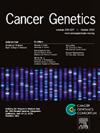通过多组学整合对不同肿瘤类型的致癌决定因素进行综合分析
IF 2.1
4区 医学
Q4 GENETICS & HEREDITY
引用次数: 0
摘要
癌症是一种复杂的异质性疾病,其特征是遗传和表观遗传改变的积累,这些改变驱动不受控制的细胞增殖和生存。本文综述了主要的癌症驱动基因,包括癌基因如KRAS和PIK3CA,以及肿瘤抑制基因如TP53、PTEN和CDKN2A,重点介绍了它们在不同类型癌症中的分子机制和作用。利用大规模癌症基因组计划和全基因组测序的见解,我们研究了体细胞突变的景观及其与标志性癌症途径的关联,包括细胞周期调节、细胞凋亡、代谢重编程和免疫逃避。包括基因组、转录组、蛋白质组和表观基因组数据在内的多组学整合能够识别新的驱动突变、功能相互作用和肿瘤特异性脆弱性。我们探索生物信息学平台,如IntOGen,促进驱动基因的检测和优先排序,并讨论新兴概念,包括合成致死率,染色质重塑缺陷和表观遗传失调,涉及基因如ARID1A, KMT2D和RB1。此外,我们回顾了针对这些分子畸变的治疗策略,包括小分子抑制剂,基于途径的治疗,以及由生物标志物指导的精确肿瘤学方法。这种综合强调了整合多维数据的重要性,以增强我们对癌症生物学的理解,并改进个性化治疗策略,以改善患者的预后。本文章由计算机程序翻译,如有差异,请以英文原文为准。
Comprehensive analysis of oncogenic determinants across tumor types via multi-omics integration
Cancer is a complex and heterogeneous disease characterized by the accumulation of genetic and epigenetic alterations that drive uncontrolled cellular proliferation and survival. This review provides a comprehensive overview of key cancer driver genes, including oncogenes such as KRAS and PIK3CA, as well as tumor suppressor genes like TP53, PTEN, and CDKN2A, highlighting their molecular mechanisms and roles across various types of cancer. Leveraging insights from large-scale cancer genome initiatives and whole-genome sequencing, we examine the landscape of somatic mutations and their association with hallmark cancer pathways, including cell cycle regulation, apoptosis, metabolic reprogramming, and immune evasion. Multi-omics integration—encompassing genomic, transcriptomic, proteomic, and epigenomic data has enabled the identification of novel driver mutations, functional interactions, and tumor-specific vulnerabilities. We explore bioinformatics platforms, such as IntOGen, that facilitate the detection and prioritization of driver genes and discuss emerging concepts, including synthetic lethality, chromatin remodeling defects, and epigenetic dysregulation, involving genes like ARID1A, KMT2D, and RB1. Furthermore, we review therapeutic strategies targeting these molecular aberrations, including small-molecule inhibitors, pathway-based therapies, and precision oncology approaches guided by biomarkers. This synthesis underscores the importance of integrating multidimensional data to enhance our understanding of cancer biology and refine personalized treatment strategies for improved patient outcomes.
求助全文
通过发布文献求助,成功后即可免费获取论文全文。
去求助
来源期刊

Cancer Genetics
ONCOLOGY-GENETICS & HEREDITY
CiteScore
3.20
自引率
5.30%
发文量
167
审稿时长
27 days
期刊介绍:
The aim of Cancer Genetics is to publish high quality scientific papers on the cellular, genetic and molecular aspects of cancer, including cancer predisposition and clinical diagnostic applications. Specific areas of interest include descriptions of new chromosomal, molecular or epigenetic alterations in benign and malignant diseases; novel laboratory approaches for identification and characterization of chromosomal rearrangements or genomic alterations in cancer cells; correlation of genetic changes with pathology and clinical presentation; and the molecular genetics of cancer predisposition. To reach a basic science and clinical multidisciplinary audience, we welcome original full-length articles, reviews, meeting summaries, brief reports, and letters to the editor.
 求助内容:
求助内容: 应助结果提醒方式:
应助结果提醒方式:


